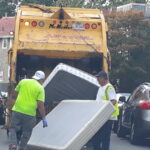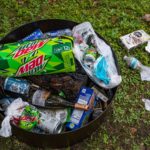By Barry Kaye, MD You are a good person. You recycle everything that you can and feel good about that. But have you wondered what happens after that big blue bin is picked up? I just assumed it was all recycled until my son told me some inconvenient truths about recycling. If you read no further—just remember that because something is recyclable, it does not mean that it will be recycled. Unless it is economically feasible and there is a market, it’s just trash. It turns out that the only things that are genuinely recycled at the present time are [READ MORE]
We Need to Enforce Waste Bans

By Janet Domenitz and Morgan Molloy Creating positive change for our climate in everyday life can be daunting, but there are ways we in the Commonwealth can make progress in the here and now. Reducing the waste we discard in landfills and incinerators reduces pollution and climate emissions. One key to reducing waste disposal is enforcing our decades-old waste ban regulations. Of the 5.6 million tons of waste we dispose of in Massachusetts each year, approximately two million tons (~40%) are banned from landfills and incinerators by Massachusetts Department of Environmental Protection (DEP) regulations. Some examples of banned materials are [READ MORE]
How Can Belmont Reduce Single-Use Plastics?

By Vincent Stanton, Jr. The United States generates more plastic waste than any other country in the world: 42 million tons, or 286 pounds per person, in 2016. That includes plastic waste the US exports to other countries with weak recycling systems (see links at end of article for details). Plastic waste lasts a long time and has many noxious effects (See “Think Twice About Single-Use Plastics,” Belmont Citizens Forum Newsletter, November 2021). The Massachusetts legislature, a recycling leader in 1981 when it passed the “bottle bill” over Governor Ed King’s veto, has become a laggard. (See “Time To Pass [READ MORE]
Time To Pass An Updated Bottle Bill

By Janet Domenitz and Julia Blatt We need to stop kicking the can down the road. Since its passage nearly 40 years ago, the bottle bill has created a successful recycling program in Massachusetts. But time is catching up to the law, and it needs updating to deliver the best results. A lot has changed in Massachusetts since the original bottle bill was established in 1983. First, our waste problem has worsened. According to the new Trash in America report released by MASSPIRG and other regional public interest groups, the average American throws out nearly 1,800 pounds of trash each [READ MORE]
Changing Economics Alter Belmont’s Recycling

By Terri Goldberg According to the US EPA, in 2017, the latest year for which they have published data, the United States recycling and composting rate was about 35%. The country’s recycling rate has been stuck in the low- to mid-30 percent range since the early 2000s in spite of the extensive efforts to improve it. In part, the recycling system has been working to keep up with the changes in the materials generated by households, businesses, and institutions. Over the past decade, the composition of municipal solid waste has been evolving away from newsprint, office paper, and glass containers [READ MORE]
Paper Bag Fee Would Reduce Emissions

By Rahul Ramakrishnan As a lifelong Belmont resident and Belmont High School alum, I take pride in Belmont’s forward-thinking mind-set and commitment to the environment. As a senior at MIT studying materials science, I have had the opportunity to learn about the diversity in production and policy surrounding the materials that make up our world. Recently, I thought about how I could use what I have learned to keep Belmont on an environmentally conscious trajectory, and an idea popped up. Problems with Plastic—and Paper For the last many years, we have repeatedly been told that paper bags are better for [READ MORE]

